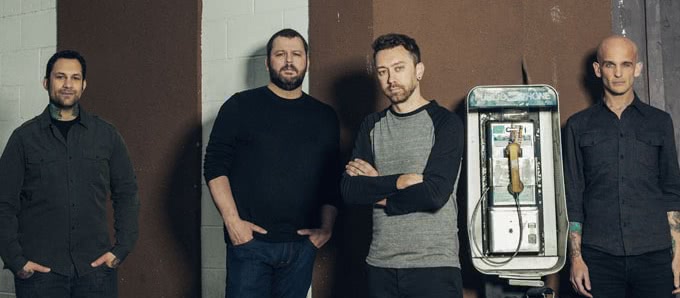There is orderliness within the universe of Rise Against. Heading into the release of their seventh studio record,The Black Market, the Chicago punk rockers have achieved the unprecedented feat of keeping the same lineup for three consecutive albums. Despite its members’ ages ranging within the late-30s-to-early-40s spectrum, there appears to be a new lease on life for the band as it prepares to return from nearly two years in the proverbial wilderness – and you best believe Rise Against are as pumped about it as their fans.
“I feel like this record as a whole captures this energy that, when we first started as a band, was really different from whatever was going on around us,” enthuses Joe Principe, the band’s bass player and one of two original members still in the fold. “I feel like it’s very present on this record – I don’t know why that is. I’m not saying that I didn’t like [2011’s] Endgame or [2008’s] Appeal To Reason, but I haven’t really felt this energy since The Sufferer & The Witness [2006]. I don’t know if it was the studio or if it was just me, but there was just this energy that was very reminiscent of when we first started as a band. I think the song maturity is just there on account of the band having been around for 15 years now.”
It’s said that every action has a reaction, and that certainly feels like it’s the case when it comes to the Rise Against discography. Each album feels as though it’s actively responding to its predecessor, whether that means taking an idea in a new direction or removing it entirely. Principe himself isn’t entirely sure that’s always the case, although he certainly appreciates how it may come across as such.
“I guess from my standpoint, as a songwriter, the songwriting in general for Rise Against is kind of ongoing,” he says. “I’m constantly writing songs throughout my year – it really is my only form of self-expression, so it’s a good representation of my mental state. I can only assume it’s the same thing for Tim [McIlrath, vocals/guitar] – I think, with each record, we grow as songwriters and our bucket of influences grows and grows the older we get. We don’t say that we’re going to try ‘this’because we did ‘this’in the past – it’s very organic with us. Nothing’s forced or anything like that. It’s pretty cool, because it works out really well for us when we start to write a new record.”
2014 marks not only ten years since the band’s third studio album, Siren Song Of The Counter Culture, but also a decade since Rock Against Bush, a punk-rock-oriented anti-war/pro-peace movement that saw bands voicing their disgust at then-US President George W. Bush and encouraging people to vote against him. Rise Against were one of the many bands to lend their support to the movement, and although it was obviously unsuccessful in the polls, the noise the movement generated was impossible to deny. When asked to reflect on that time, and whether such a thing could happen again, Principe points to defiant politics as an ever-present factor in what makes the punk genre so important.
“I think you’re always going to have that element in punk rock,” he says. “Punk in its most raw state is about change, obviously. I think the grass roots of the movement will always be there. There will always be people inspiring change. We definitely try to carry that in our music; so do bands like Bad Religion and even Pennywise.
“Of course, that isn’t for everybody – even in punk rock. I don’t expect everyone to be political or to constantly sing about worldly issues. I do feel, however, that it will always be there in its element. That’s awesome. That’s the nature of that movement. That’s what drew me to it at a young age – I didn’t feel comfortable anywhere else but in the punk scene. That’s why you can voice your opinion, and there’s always going to be a need to do that. It’s a great platform for that.”
The gaps between Appeal To Reason and Endgame – as well as between Endgame and The Black Market – may seem normal to a lot of bands within the record-release-tour cycle, but for a group which once dropped a new record barely 12 months after the previous one, it might feel unusual. This is not lost on Principe, who admits to once worrying about being forgotten but now insists that the band’s happiness – and sanity – come first.
“We all have families and children,” he explains. “Zach [Blair, guitar] got married during our break between the last record and this one. Everyone was kind of just relaxing with family in that time, but we’ve also never taken a break this long in 15 years. We felt like we could, and that it would be OK. I think we were nervous about doing it before, because we were worried that if we went away too long, it could hurt the band. I think we went away the right amount of time to clear our heads, but now it’s time to get back into it.”
The Black Market out now through Interscope / Universal.


































